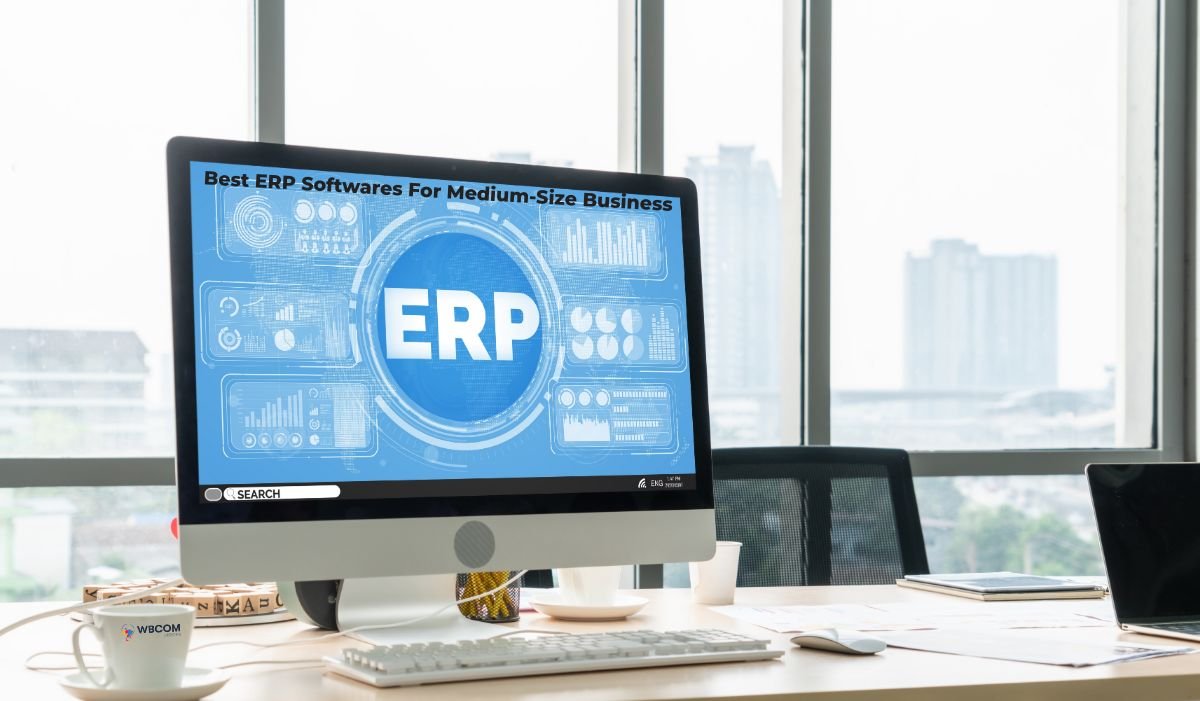In today’s dynamic business landscape, medium-size businesses face increasing complexity and competition, making efficient management crucial for sustainable growth. Enterprise Resource Planning (ERP) software plays a pivotal role in addressing these challenges by providing comprehensive solutions for managing various business processes. From inventory and supply chain management to finance, human resources, and customer relationship management, ERP systems offer integrated functionalities that streamline operations, enhance productivity, and drive profitability. These systems consolidate data from different departments into a centralized database, facilitating seamless communication and collaboration across the organization.
With real-time insights and analytics, ERP software empowers decision-makers to make informed choices, optimize resource allocation, and adapt to changing market conditions swiftly. As businesses continue to evolve and expand, the need for robust ERP solutions becomes increasingly evident. In this blog, we’ll delve into the top ERP software options tailored specifically for medium-sized businesses, offering a comprehensive overview of their features, benefits, and suitability for various industry verticals.
Table of Contents
ToggleBenefits of ERP Software for Medium-sized businesses
- Improved efficiency and productivity: ERP software helps automate routine tasks, reduce manual errors, and streamline workflows, leading to increased efficiency and productivity within medium-sized businesses.
- Streamlined business processes: By integrating various departments and functions, ERP systems eliminate silos and ensure smooth coordination across different business processes, resulting in streamlined operations.
- Enhanced data visibility and reporting: ERP solutions provide real-time access to accurate and comprehensive data, enabling medium-sized businesses to make informed decisions based on insightful analytics and reporting.
- Better decision-making capabilities: With access to reliable data and advanced analytics tools, medium-sized businesses can make strategic decisions faster and more effectively, driving growth and profitability.
- Scalability and flexibility: ERP software is designed to grow with the business, offering scalability and flexibility to adapt to changing needs and requirements as the organization expands.
Also Read: Mastering Product Page SEO: Shopify Seller’s Guide
Key Features to Consider in ERP Software
Integration capabilities with existing systems
An essential feature of ERP software is its ability to seamlessly integrate with existing systems and applications within the organization. This integration ensures that data flows smoothly between different departments and processes, eliminating the need for manual data entry and reducing the risk of errors.
Customization options to fit specific business needs
Medium-sized businesses have unique requirements and workflows that may differ from industry standards. Therefore, ERP software must offer customization options that allow organizations to tailor the system to their specific needs. This includes customizable workflows, data fields, and user interfaces to optimize efficiency and effectiveness.
User-friendly interface and ease of use
ERP software should have an intuitive and user-friendly interface that makes it easy for employees at all levels to navigate and utilize the system effectively. A user-friendly ERP system reduces training time, increases user adoption rates, and enhances overall productivity within the organization.
Comprehensive reporting and analytics
A robust ERP solution should provide advanced reporting and analytics capabilities that enable medium-sized businesses to gain valuable insights into their operations. This includes customizable dashboards, real-time data visualization tools, and predictive analytics features that help organizations make data-driven decisions and identify trends and opportunities for improvement.
Customer support and training resources
Effective customer support and comprehensive training resources are essential aspects of ERP software implementation and ongoing usage. Medium-sized businesses should look for ERP vendors that offer responsive customer support services, including phone support, email support, and online knowledge bases. Additionally, comprehensive training programs and resources help employees learn how to use the ERP system efficiently and maximize its benefits for the organization.
Top 10 ERP Software for Your Medium-Sized Business
1. NetSuite ERP
NetSuite ERP is a cloud-based enterprise resource planning (ERP) software suite that offers comprehensive solutions for medium-sized businesses. It provides a wide range of features to manage various aspects of business operations, including financial management, inventory management, supply chain management, and customer relationship management (CRM). With NetSuite ERP, businesses can streamline their processes, improve efficiency, and gain better visibility into their operations.
Key Features:
- Financial Management: Includes modules for general ledger, accounts payable, accounts receivable, and financial reporting.
- Inventory Management: Allows businesses to track inventory levels, manage orders, and optimize stock levels.
- Supply Chain Management: Enables businesses to manage procurement, production, and distribution processes efficiently.
- CRM: Provides tools for managing customer relationships, tracking sales opportunities, and delivering personalized customer experiences.
- Business Intelligence: Offers advanced reporting and analytics capabilities to gain insights into business performance and make informed decisions.
Price: NetSuite ERP pricing varies based on factors such as the number of users, modules required, and customization options.
2. SAP Business One
SAP Business One is an integrated ERP solution designed specifically for small and medium-sized businesses. It offers a range of features to help businesses streamline their processes, improve efficiency, and drive growth. SAP Business One provides modules for various business functions, including finance, sales, purchasing, inventory, and production.
Key Features:
- Financial Management: Offers tools for managing accounting, banking, budgeting, and financial reporting.
- Sales and Customer Management: Enables businesses to manage sales orders, track customer interactions, and analyze sales performance.
- Purchasing and Procurement: Facilitates procurement processes, supplier management, and purchase order management.
- Inventory and Production Management: Helps businesses optimize inventory levels, track production processes, and manage bill of materials (BOM).
- Business Intelligence: Provides reporting and analytics capabilities to help businesses gain insights into their operations and make data-driven decisions.
Price: SAP Business One pricing depends on factors such as the number of users, deployment options, and customization requirements.
3. Microsoft Dynamics 365
Microsoft Dynamics 365 is a comprehensive ERP software solution that integrates various business processes and functionalities. It offers modules for finance, sales, marketing, customer service, and more. With features like advanced analytics, AI-driven insights, and customizable workflows, Dynamics 365 helps medium-sized businesses streamline operations and drive growth. Pricing varies based on the specific modules and functionalities required, with subscription-based plans available.
Key Features:
- Integrated Modules: Covering finance, sales, marketing, customer service, and more.
- Advanced Analytics: AI-driven insights for data-driven decision-making.
- Customizable Workflows: Tailor processes to specific business needs.
- Scalability: Easily scales to accommodate business growth.
- Cloud-Based: Accessible from anywhere with an internet connection.
4. Sage Intacct
Sage Intacct is a cloud-based ERP solution designed to streamline financial management processes for medium-sized businesses. It offers a comprehensive suite of features tailored to meet the diverse needs of modern finance teams. With Sage Intacct, businesses can manage their accounting, financial planning, and reporting with ease, ensuring accuracy and compliance at every step. Its intuitive interface and customizable dashboards provide users with real-time insights into their financial performance, empowering informed decision-making. Additionally, Sage Intacct integrates seamlessly with other business systems and applications, allowing for enhanced collaboration and efficiency across departments.
Key Features:
- Advanced Financial Management: Includes tools for accounts payable, accounts receivable, general ledger, and cash management.
- Scalable Platform: Designed to grow with your business, offering flexibility and customization options to adapt to changing needs.
- Robust Reporting and Analytics: Provides powerful reporting capabilities and customizable dashboards for real-time insights.
- Integration Capabilities: Seamlessly integrates with other business systems and applications, such as CRM and payroll software.
- Automation and Workflow: Automates routine tasks and workflows, increasing efficiency and reducing manual errors.
Pricing: Sage Intacct offers subscription-based pricing tailored to the needs and size of each business. Pricing typically starts at a base fee per month, with additional costs for user licenses and advanced features.
5. Odoo
Odoo is an open-source suite of business applications that encompasses various modules for enterprise resource planning (ERP), customer relationship management (CRM), e-commerce, accounting, inventory management, and more. It provides businesses with a comprehensive and integrated solution to manage different aspects of their operations efficiently.
Key Features:
- Modular Approach: Odoo offers a modular structure, allowing businesses to choose and integrate only the modules they need, ensuring a customized and cost-effective solution.
- All-in-One Solution: With modules covering various business functions, Odoo provides a centralized platform for managing processes like sales, procurement, manufacturing, accounting, and HR.
- User-Friendly Interface: Odoo features an intuitive and user-friendly interface, making it easy for employees to navigate and utilize the system effectively.
- Customization Capabilities: Businesses can customize Odoo to align with their unique requirements, including workflows, reports, and dashboards, ensuring a tailored solution.
- Community and Enterprise Editions: Odoo offers both a community edition, which is open-source and free to use, and an enterprise edition, which provides additional features, support, and services for a subscription fee.
Price: Odoo’s pricing varies based on the edition (community or enterprise) and the modules required. The community edition is free, while the enterprise edition pricing depends on the number of users and selected modules.
6. Infor ERP
Infor ERP is an enterprise resource planning (ERP) software designed to streamline business operations and enhance productivity for medium to large-sized enterprises. It offers comprehensive features to manage various aspects of business operations, including finance, supply chain, manufacturing, distribution, and human resources. With robust functionality and flexibility, Infor ERP enables organizations to optimize their processes, improve decision-making, and drive growth.
Key Features:
- Finance Management: Infor ERP provides tools for accounting, budgeting, financial reporting, and compliance, ensuring accurate and efficient financial management.
- Supply Chain Optimization: The software offers features for inventory management, demand planning, procurement, and supplier collaboration to optimize supply chain operations and reduce costs.
- Manufacturing Control: Infor ERP includes modules for production planning, scheduling, quality control, and shop floor management, enabling manufacturers to streamline processes and improve productivity.
- Distribution and Logistics: With capabilities for warehouse management, order fulfillment, transportation management, and route optimization, Infor ERP helps businesses optimize their distribution and logistics operations.
- Human Capital Management: The software offers HR modules for employee management, payroll processing, benefits administration, and workforce planning, enabling organizations to effectively manage their human resources.
Price: Pricing for Infor ERP varies based on factors such as the size of the organization, the number of users, and the specific modules required. Interested businesses can request a quote from Infor for customized pricing information.
7. Epicor ERP
Epicor ERP is an enterprise resource planning software solution designed to streamline and optimize business processes for medium to large-sized enterprises. It offers a comprehensive suite of integrated modules that cover various aspects of business operations, including finance, manufacturing, distribution, supply chain management, human resources, and customer relationship management.
Epicor ERP provides real-time insights into business performance, enables efficient resource planning and allocation, enhances collaboration across departments, and supports regulatory compliance. Its modular architecture allows businesses to customize the system according to their specific needs and scale as they grow. Epicor ERP is available through a subscription-based pricing model, with costs varying based on the number of users, modules selected, and additional customization requirements. Pricing information can be obtained directly from Epicor or authorized resellers.
Also Read: The Future of Community Building with WordPress: Trends and Innovations
8. Acumatica Cloud ERP
Acumatica Cloud ERP is a comprehensive enterprise resource planning (ERP) solution designed to streamline business operations and drive growth. It offers a range of modules for managing various aspects of a business, including finance, inventory, sales, purchasing, project management, and more. With its cloud-based architecture, Acumatica provides flexibility, scalability, and accessibility, allowing businesses to access critical data and functionality from anywhere with an internet connection.
Its user-friendly interface and customizable dashboards empower users to tailor the system to their specific needs, while robust reporting and analytics capabilities provide insights to inform strategic decision-making. Additionally, Acumatica offers integrations with other business systems, ensuring seamless data flow across the organization.
Key Features:
- Comprehensive Modules: Covers finance, inventory, sales, purchasing, project management, and more.
- Cloud-Based: Provides flexibility, scalability, and accessibility from anywhere.
- Customization: User-friendly interface and customizable dashboards to tailor the system to specific needs.
- Reporting and Analytics: Robust capabilities for generating insights and informing strategic decisions.
- Integrations: Seamless integration with other business systems for data flow optimization.
Pricing: Acumatica Cloud ERP offers various pricing plans based on the number of users and the specific modules required by the business.
9. Plex Manufacturing Cloud
The Plex Manufacturing Cloud is an integrated cloud-based enterprise resource planning (ERP) solution designed specifically for manufacturing businesses. It offers comprehensive functionalities to manage various aspects of manufacturing operations, including production planning, inventory management, quality control, supply chain management, and financials. With real-time data visibility and analytics, Plex Manufacturing Cloud enables manufacturers to optimize their processes, reduce costs, improve quality, and increase operational efficiency.
Key feature:
- Production Planning and Scheduling: Helps manufacturers optimize production schedules, allocate resources efficiently, and meet customer demand effectively.
- Inventory Management: Provides real-time visibility into inventory levels, locations, and movements, enabling better inventory control and minimizing stockouts.
- Quality Management: Enables manufacturers to maintain and improve product quality by implementing quality control processes, tracking defects, and managing corrective actions.
- Supply Chain Management: Facilitates collaboration with suppliers, streamlines procurement processes, and ensures timely delivery of materials and components.
- Financial Management: Offers robust financial modules for managing accounts payable, accounts receivable, general ledger, and financial reporting, providing insights into the financial health of the business.
Pricing: Plex Manufacturing Cloud varies based on factors such as the size of the organization, the number of users, and the specific modules required.
Also Read: Navigating the Evolving Landscape of Blogging: Trends and Strategies for 2024
10. IQMS ERP
IQMS ERP is a comprehensive enterprise resource planning (ERP) software designed to streamline and optimize various business processes for medium to large-sized manufacturing companies. This robust solution integrates core functionalities such as inventory management, production scheduling, quality control, supply chain management, and financials into a single platform, enabling companies to enhance operational efficiency, reduce costs, and improve overall performance.
IQMS ERP provides a centralized database that facilitates real-time data sharing and analysis across different departments, enabling better decision-making and resource allocation. With its user-friendly interface and customizable features, IQMS ERP offers a tailored solution to meet the unique needs and requirements of manufacturing businesses. Additionally, the software offers robust reporting and analytics capabilities, allowing companies to gain valuable insights into their operations and performance metrics.
Key Features:
- Inventory Management: Track and manage inventory levels reorder points, and stock movements efficiently.
- Production Scheduling: Create and manage production schedules to optimize resource utilization and meet delivery deadlines.
- Quality Control: Implement quality control measures to ensure products meet industry standards and customer expectations.
- Supply Chain Management: Streamline procurement processes and manage supplier relationships to ensure timely delivery of materials.
- Financial Management: Monitor financial performance, track expenses, and manage accounts payable and receivable to maintain financial health.
Pricing: The pricing for IQMS ERP varies depending on the specific requirements and customization options chosen by the customer.
Also Read: Unveiling the Essential Services of Digital Marketing Agencies
How to Choose the Right ERP Software for Your Medium-Sized Business
Choosing the right ERP software for your medium-sized business requires careful consideration of several factors to ensure it aligns with your needs and goals. Here’s how to make the right choice:
- Assess Your Business Needs: Start by identifying your business requirements, including core processes, industry-specific functionalities, scalability, and integration needs.
- Define Your Budget: Determine your budget for ERP implementation, including software licenses, implementation costs, training, and ongoing support.
- Research Available Options: Explore different ERP software vendors and solutions available in the market. Consider factors such as reputation, customer reviews, industry expertise, and vendor stability.
- Evaluate Features and Functionality: Look for ERP systems that offer the features and functionalities your business requires, such as financial management, inventory control, CRM, manufacturing, and reporting capabilities.
- Consider Scalability: Choose an ERP solution that can grow with your business. Ensure it offers scalability to accommodate future expansion and increasing transaction volumes.
- Assess Integration Capabilities: Check the ERP system’s compatibility with your existing software applications, such as CRM, accounting, and e-commerce platforms. Seamless integration can streamline operations and data management.
- Review User Experience: Evaluate the ERP software’s user interface and usability. A user-friendly interface and intuitive navigation are essential for user adoption and productivity.
- Check Customization Options: Assess the ERP system’s flexibility and customization capabilities. It should allow you to tailor the software to meet your specific business needs and workflows.
- Consider Deployment Options: Decide whether you prefer on-premises or cloud-based ERP deployment. Cloud-based solutions offer scalability, accessibility, and lower upfront costs, while on-premises deployments provide greater control over data and security.
- Request Demos and Trials: Schedule demos and request trial versions of shortlisted ERP software to test their functionality, usability, and compatibility with your business processes.
By following these steps and thoroughly evaluating your options, you can choose the right ERP software that empowers your medium-sized business for growth and success.
Conclusion
ERP software offers numerous benefits for medium-sized businesses, including improved efficiency, streamlined processes, enhanced data visibility, better decision-making capabilities, and scalability. By investing in the right ERP solution, businesses can optimize their operations and drive growth. We encourage businesses to explore the recommended ERP software options carefully, considering factors such as functionality, scalability, integration capabilities, and user experience. Implementing ERP software is crucial for medium-sized businesses to stay competitive, adapt to changing market dynamics, and achieve long-term success in today’s dynamic business environment.
Interesting Reads:
Analyzing the Impact of Google’s March 2024 Core Update on Search Rankings
4 Ways to Use PR for Your eCommerce Business
Navigating The Clouds: An In-Depth Review Of xCloud For WordPress







